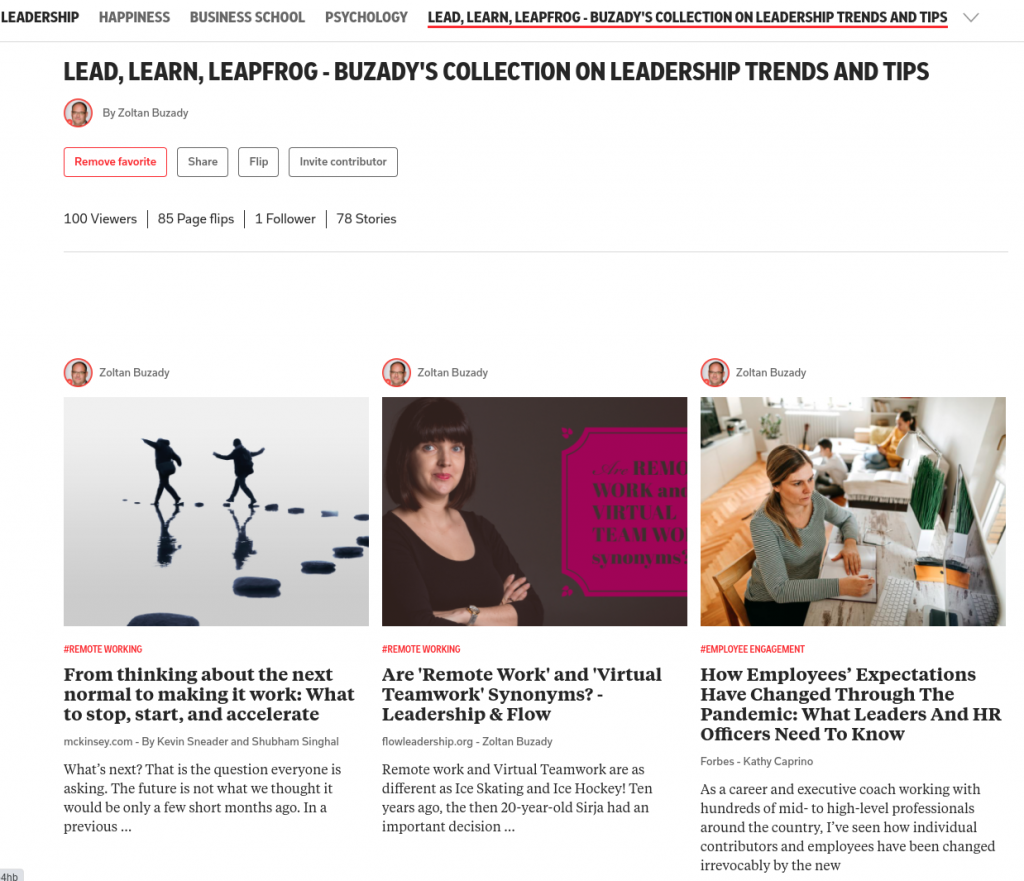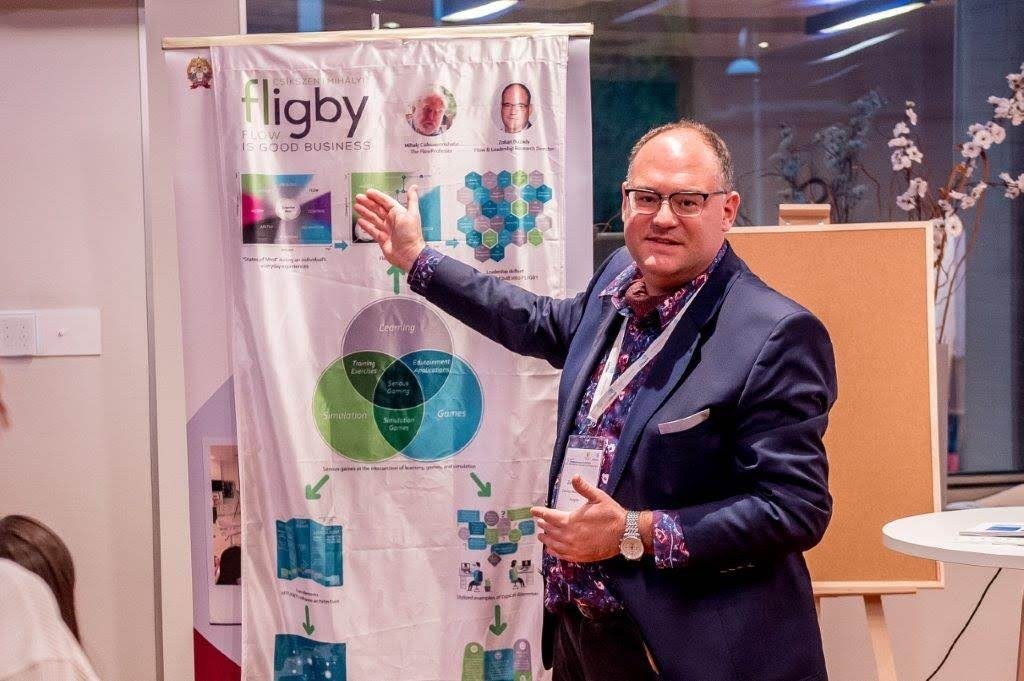NOTE: This blog assumes that the listener/reader would be familiar with the most basic concepts of FLOW and the globally-awarded management game, FLIGBY.
A quick summary of those essentials are available Here.
👀👥🗣👥🧠 #Sneek #Read here: What is Zoltan Buzady discussing with his great students on his #GlobalManagementPractice CEMS – The Global Alliance in Management Education course at Corvinus University of Budapest
The BIG Question:
Are there situations in which someone’s mental states (anxiety or boredom etc.) is simply caused by the fact that the person has no personal interest in the given topic or the task at hand. Or put it differently, can any topic be made interesting to anyone, if all the 4 Flow conditions are met, i.e. by matching challenges to the person’s level of skills?
First, find out the answer! Watch my video (15 mins) here:
And here are the slides for viewing.
BUT THEN, I got this super interesting follow-up question.
So read my expert reply:
“Hi Zoltán, Many thanks for the comprehensive response!
Q: So if I understand your position correctly then any topic can (at least in theory) be made interesting to any person given that they have the right approach to balancing complexity and integration. So if for example, you were to pick a random person with his specific skillset and put her on a deserted island where there is only one activity that can be performed (let’s say winemaking), regardless of this person’s initial perceived level of interest in this topic he could learn to enjoy this activity eventually, provided that it is possible to find a level of challenge that meets their current skillset and skill level.
Reply by Buzady: Yes I think so. I wish for that person to discover some inner or external goal to achieve in these circumstances. Here an extreme point in case: Logotherapy
Q: I have two follow-up questions regarding this. The first question relates to if there is a non-removable obstacle to achieve this balance. Let’s say a person experiences flow initially at the basic level of skill and challenge but then after a while becomes bored with this topic as it becomes routine and wants to take on the next level of challenge to make it more interesting. Let us also assume that it is always possible to become aware of what the next skill level would require either through own research/contemplation or feedback from others, i.e. the person can always become aware of what skill they must cultivate to meet the next level of challenge. The problem is that there is an obstacle and the person is therefore not able to develop the next skill level regardless of how much the person in question is trying to learn this skill. I suppose one way of looking at it would be that the main activity requires learning a sub-activity and that this sub-activity is simply too challenging for the person in question to be able to learn it. I am a firm believer that most people are able to learn most things provided that they put in the required effort and use the best available method of learning (e.g. being honest with themselves, seeking the best sources of knowledge, teachers, and feedback). However, it would also seem that some people are not able to learn some skills, no matter how hard they try.
Reply by Buzady: Yes this can happen! This is why we primarily recommend to build upon your existing STRENGTHS and not to focus too much on what people often call “overcoming your Weaknesses”.
Q: That even if effort accounts for 90% of the result there is also 10% that is attributed to talent, and if you are not gifted with this biological trait then you will never be able to learn the skill in question and therefore you will reach a point in your development where you are not able to experience flow from this activity any longer. So to put it more simply, if I agree that in practice most people can learn to enjoy most things provided that they balance complexity and integration (and that most obstacles are removable through effort), would you agree that there could be some instances where some people are not able to learn to enjoy some activities since there is a non-removable obstacle hindering the required skill development and that therefore these individuals are better off pursuing flow in other activities?
Reply by Buzady: Yes, I agree. You will discover it yourself in your own life, as a leader and also with www.fligby.com simulation! It is part of the leader’s role then adjusts the work allocation. Similarly to a good teacher, who after observing a child’s skills ideally would direct him/her to the most suitable area of activities.
Q: The second question relates to a person who is a generalist, a happy amateur in many topics. In reality (as opposed to the deserted island) there is such a vast amount of topics that it is impossible for any person, regardless of their talent or effort, to become an expert in every topic in their lifetime. Let’s say that this person has a curious nature and a broad structure of knowledge. When this person encounters a new topic he is very good at finding flow at the initial stages. He looks at the right material to learn the topic from the most basic level and to connect this knowledge with other fields that he has looked into previously, and the person is experiencing flow in this moment. But then the person in question has reached a moderate level of skill and challenge in this field and is starting to experience less flow than in the beginning and the person discovers another topic where he has no prior experience. The person is faced with the decision to either shift his focus to build the basic knowledge and skill in a new field where the challenges are basic or to proceed in the current field and build expert skills in order to be able to meet expert challenges. Let us also assume that it would be more productive from an objective point of view (e.g. income, power, influence) if this person eventually found a topic in which to go deeper and build their expertise (as opposed to always building a broader skillset). How would you go about adjusting the level of challenge to motivate the person in question to continue building expertise in the current field than to abandon this topic and go into the new field where this person believes that he will experience a (temporarily) higher level of flow at the initial basic level of challenge?
Reply by Buzady: In my reading, you just described an autotelic person, who is more prone to discover Flow, happiness, meaning in whatever activity is at hand. As a leader you try to keep that person to achieve the positive organizational benefits of his/her work, such as mastery, development, creativity, positivism and good mood – but note: such a person will be less motivated by the external motivators you mentioned above (income, power, and influence), but more by his/her inner-satisfactions. To further complicate this matter – consider that some personality types (“Red”/”Promoter”) are strong in action and interpersonally oriented – thus for them, these factors actually overlap with their inner-motivations, drivers and sources of finding Flow! This is why there is a general debate that too many CEOs are actually unsuitable to fulfill their organizational mission and roles as desirable, but rather follow their own inner ambitions. (see “narcissistic CEO” here)

Student: Thank you and have a nice day!
YEAH, and THEN I got this 2nd follow-up Question!:
Student: Thank you for the follow-up. While there is often much that can be done to adjust the level of challenge to meet the skill level of an individual to increase Flow for most activities, in some cases, it is better to redirect the efforts of an individual if his strengths ly in another field.
Comment by Buzady: YES!
Student: An individual with an autotelic personality is can easily focus his efforts on activities that fulfill his inner sense of meaning, his inherent motivation, and as a consequence does not worry too much whether activities provide external rewards or not.
Comment by Buzady: YES! Let us all try to discover the autotelic personality traces in ourselves!
Best wishes,
Dr. Zoltan Buzady,
Associate Professor, Corvinus University of Budapest,
Director, Leadership & Flow Global Research Network, www.flowleadership.org
#connectivity
May the Flow be with you!
Zoltan Buzady
Stay up to date and follow us also on Facebook!

